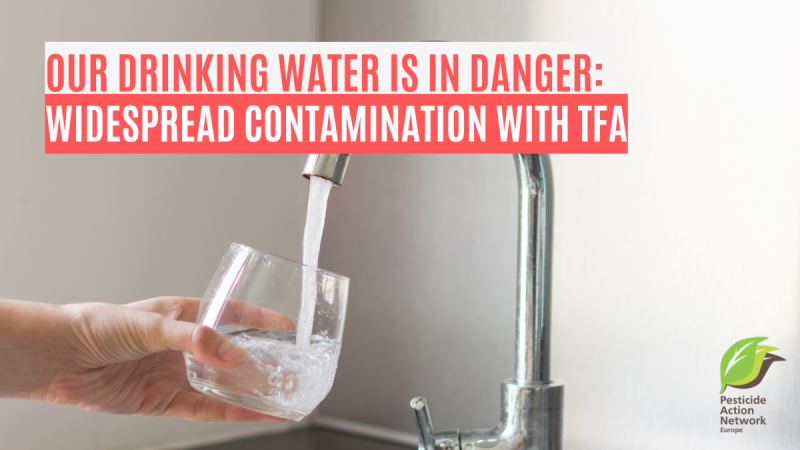Our drinking water is in danger. Everywhere in Europe, TFA is found in surface and drinking water. Alarmed by our reports, the Belgian region of Wallonia asked the Water Distribution Company to monitor water for this small PFAS. We eagerly await the results. A local authority did the same and their results are far from reassuring. Three towns in agricultural areas found high levels of TFA in their drinking water. In a recent report, the German Environment Agency (UBA) reiterates its warning of the TFA problem. While some countries already monitor the substance, many others like France have yet to begin. Our member Générations Futures disclosed that 12 pesticide metabolites with high contamination risk are not measured in the water tests, including TFA.
In two reports, PAN Europe and members in 11 European countries warn of the widespread occurrence of Trifluoroacetic Acid or its salt Trifluoroacetate (TFA) in surface, ground and tap water. [1, 2, 3]. This small PFAS is a breakdown product of many PFAS pesticides and also some F-gases used for refrigeration. Over 20 years ago, the European Food Safety Authority, EFSA and EU Member States declared it a ‘non-relevant metabolite’, fed by industry claims that because of its high water solubility, it will not accumulate in the human body.
However, 20 years after this assumption, we face a major problem. TFA is everywhere in our water resources. It is highly soluble and mobile, it is very persistent in the environment, with growing evidence pointing to its toxicity. German authorities now consider it as a probable reprotoxic substance.
Water companies are alarmed. They provide clean drinking water but are faced with an increasing challenge. To date, only reverse osmosis can be used to filter TFA from water. This is an exorbitantly expensive system for the communities and would lead to completely demineralised water.
In the meantime, the EU has revised the directive on water intended for human consumption. This regulation limits the ‘Total PFAS’ to 500 nanograms per litre from January 2026. In our report, we documented that 96% of the PFAS amount in water is TFA. In many areas, especially in agricultural zones, this limit is exceeded for TFA alone. Only a swift ban of TFA emitting PFAS pesticides and F-gases can solve this problem at some point. Therefore, PAN Europe and its members advocate to ban all PFAS pesticides now.
Alarming results of recent measurements in Wallonie
After the media attention around our reports, the Belgian region of Wallonia launched a region-wide TFA monitoring programme in water intended for human consumption. Results are expected soon, but the results have already been presented by the town of Ciney, in the area with intensive agriculture, especially cereals, are alarming:
- 1100 ng/l in the town of Ciney
- 1600 ng/l in the town of Pessoux
- 2400 ng/l in the town of Braibant
Following the communication of these results, the city council decided at its meeting last September:
- To demand the application of the new standard in the European Drinking Water Directive, limiting the presence of all PFAS [including TFA] to 500 ng/l.
- To ask the Ministers of Health, the Environment and Agriculture to apply the precautionary principle until the non-toxicity of the PFAS molecules contained in these pesticides can be proven
Our member Nature & Progres is asking for a ban on the 29 PFAS active substances authorised in pesticide products in Belgium, like flufenacet, diflufenican and fluazinam, to protect our water and our health.
Inadequate monitoring of water quality in France
Our member organisation Générations Futures analysed the official water monitoring data in France. Of the 79 pesticide metabolites that are likely to contaminate groundwater, they identified, only 23 have been monitored in 2022/2023. In contrast, 56 metabolites are not monitored in groundwater or drinking water at all. The organisation concludes that water pollution in France by pesticide metabolites is vastly underestimated. Among the monitored ones are 12 particularly high-risk metabolites. Eight of these metabolites come from active substances that are carcinogenic, mutagenic, reprotoxic, or endocrine disruptors. One of the not yet measured metabolites is TFA. [3]
German 2017-2021 groundwater report
Germany is one of the few countries actively monitoring TFA. A 2017-2021 report from the German Umweltbundesamt (UBA) revealed that while the water pollution by pesticide active substances has decreased, the detection of pesticide breakdown products, including TFA, is multiplying.
“The contamination of groundwater with pesticide substances has decreased. This is shown by a recent nationwide study of more than 16,000 measuring points. The decline mainly concerns substances that are no longer authorised and whose concentration in groundwater is now slowly decreasing. Metabolites, on the other hand, are appearing much more frequently - now at over 70 per cent of the monitoring sites.”
The institute expresses concerns about TFA, included in the annual report for the first time. “Comprehensive monitoring data for non-degradable trifluoroacetic acid (TFA) was analysed for the first time. TFA is a metabolite of various pesticides, but can also have causes other than agriculture. The substance is found in groundwater at 76 per cent of the monitoring sites and therefore almost everywhere. These findings represent a major challenge, as the substance can hardly be technically removed during treatment.” [5]
Conclusion
TFA contamination is a huge and increasing problem. Since there are no effective means to remove it from drinking water, there is only one viable solution: An immediate ban on all PFAS pesticides and other substances that break down into TFA. PAN Europe and its members call for a ban on these chemicals to protect our water and our health.
Notes:
[1] TFA in Water: Dirty PFAS Legacy Under the Radar, PAN Europe and members, May 2024
[2] TFA: The Forever Chemical in the Water We Drink, PAN Europe and members, July 2024
[3] Campaign PAN Europe: Ban PFAS Pesticides and TFA
[4] Pesticide metabolite report, the tip of the iceberg, Générations Futures, 9 Oct 2024
[5] Pestizide im Grundwasser: Weniger Wirkstoffe, mehr Metaboliten, Umweltbundesamt UBA, Oct 2024
